Owners Title Insurance Coverage:
Protect Your Investment
Get an Owner's Policy to Protect Your Investment
Buying a new home is one of life’s most gratifying experiences and is likely the biggest investment you will ever make. Be sure not to overlook the single most important step in the process of closing on your home – the purchase of owner’s title insurance. An owner’s title insurance policy provides both peace of mind and financial protection against covered prior losses and defects, and provides legal defense for covered risks. There can be any number of prior problems that remain undisclosed after the most meticulous search of public records. These prior hidden “defects” may not be discovered for months or even years after you purchase your property. You could be forced to spend substantial money on a legal defense to protect your rights.
Make sure you purchase an owner’s title insurance policy to protect your investment. For a one-time fee an owner’s policy can protect your important property rights for as long as you or your heirs own the property.
Enhanced vs. Standard Coverage
Notes: Covered risks listed are occurring after the policy date. This policy is for use, when requested, for one-to-four family residences only. It should not be used for vacant land or for new construction. If issued on new construction, you must independently verify the payment of all lienable construction costs and the issuance of all required occupancy permits. Deductibles may apply with respect to certain of the coverages afforded in this policy. Contact Innslake Title for specific information as to any deductibles which pertain to the coverages in the Homeowner’s Policy of Title Insurance. For additional questions contact Innslake Title. *Coverage for the item is not provided in the ALTA Owner’s Policy UNLESS notice of the covenant, ordinance, statute or regulation is recorded in the public land records.
Parts of a Title Policy
The owner’s policy has five sections: covered risks, the exclusions from coverage, Schedule A, Schedule B and the conditions. Click here for a pdf.
1. Covered Risks
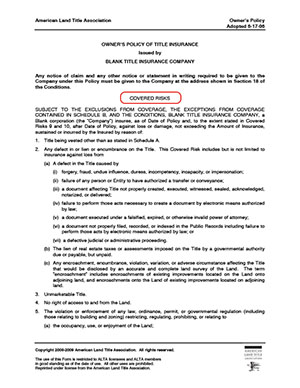 This section lists what kinds of risks the policy insures against. However, the policy makes it clear that the insurance of the listed risks are subject to (1) the Exclusions listed following the Covered Risks, (2) any exceptions listed in Schedule B, and (3) the Conditions. In the most current ALTA Owner’s policy, there are ten covered risks listed in the policy. Some of the most important covered risks are:
This section lists what kinds of risks the policy insures against. However, the policy makes it clear that the insurance of the listed risks are subject to (1) the Exclusions listed following the Covered Risks, (2) any exceptions listed in Schedule B, and (3) the Conditions. In the most current ALTA Owner’s policy, there are ten covered risks listed in the policy. Some of the most important covered risks are:
- the risk that someone else owns your property
- that there is some defect or encumbrance on your title caused by fraud or forgery
- any liens for real estate taxes or assessments that are due but unpaid
- that your title is unmarketable, that is, you are unable to sell your property to a purchaser because of a title defect
- right of access to and from your land.
Review your owner’s policy or ask your title agent about the covered risks included in your policy.
2. Exclusions
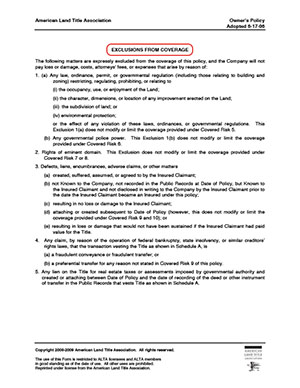 Exclusions limit the coverage of the policy. They deal with issues that are outside the control of the title company. The ALTA owner’s policy contains five exclusions, which include matters such as governmental regulations on the land and eminent domain, as well as title matters created or agreed to by the insured, or title defects known to the insured but not disclosed in writing to the title company prior to the date of the policy. The policy does not insure against any defect or title issue that is created or attaches to the property after the date of the policy. Also, the policy does not insure against the effects of bankruptcy law on the transaction creating the insured interest.
Exclusions limit the coverage of the policy. They deal with issues that are outside the control of the title company. The ALTA owner’s policy contains five exclusions, which include matters such as governmental regulations on the land and eminent domain, as well as title matters created or agreed to by the insured, or title defects known to the insured but not disclosed in writing to the title company prior to the date of the policy. The policy does not insure against any defect or title issue that is created or attaches to the property after the date of the policy. Also, the policy does not insure against the effects of bankruptcy law on the transaction creating the insured interest.
3. Schedule A
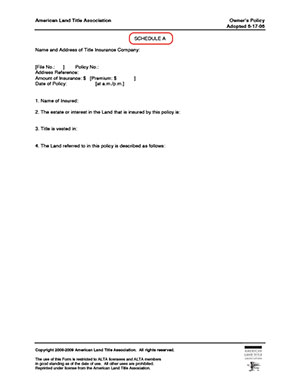 Schedule A sets forth the specific information on the title and policy, such as the date of policy, the amount of insurance, the insured, the legal description of the land insured by the policy and the estate insured, such as fee simple or leasehold. Schedule A must be attached to the policy in order for the policy to be valid.
Schedule A sets forth the specific information on the title and policy, such as the date of policy, the amount of insurance, the insured, the legal description of the land insured by the policy and the estate insured, such as fee simple or leasehold. Schedule A must be attached to the policy in order for the policy to be valid.
4. Schedule B
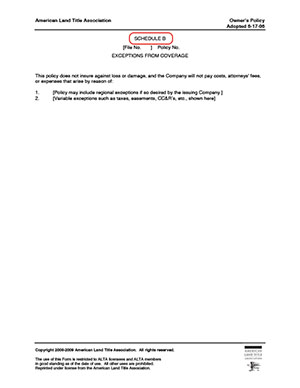 Schedule B lists the various exceptions to the title that the title company found when it performed its title search. Common exceptions would be things such as prior unreleased mortgages on the property, easements, taxes, restrictions on the use of the property, and any other limitations on the title such as homestead rights or survey issues if no survey has been performed. By listing various items as exceptions, the title company is telling the insured that these items are not covered by the title policy, and that the title company will not pay a claim or defend against a claim based on these excepted items.
Schedule B lists the various exceptions to the title that the title company found when it performed its title search. Common exceptions would be things such as prior unreleased mortgages on the property, easements, taxes, restrictions on the use of the property, and any other limitations on the title such as homestead rights or survey issues if no survey has been performed. By listing various items as exceptions, the title company is telling the insured that these items are not covered by the title policy, and that the title company will not pay a claim or defend against a claim based on these excepted items.
5. Conditions
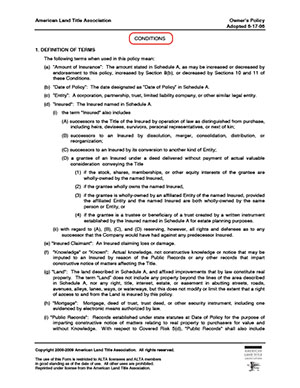 This section outlines the relationship between the insured and the title company. Paragraph 1 contains the definitions of certain terms used in the policy. Terms such as “Insured,” “Insured Claimant,” “Knowledge” and “Public Records” are defined so as to eliminate any ambiguity. There are several different paragraphs setting out how a claim under the policy is handled, including how to provide notice of a claim, what is required to prove loss, and the requirement that the insured must cooperate with the title company in the handling of the claim. Click here to learn how to file a claim. The Conditions describe the rights of the title company to pay or settle the claim, and the determination, extent and limitation of liability. Most policies also contain a paragraph that allows the insured or the title company to demand arbitration if the amount is under $2 million.
This section outlines the relationship between the insured and the title company. Paragraph 1 contains the definitions of certain terms used in the policy. Terms such as “Insured,” “Insured Claimant,” “Knowledge” and “Public Records” are defined so as to eliminate any ambiguity. There are several different paragraphs setting out how a claim under the policy is handled, including how to provide notice of a claim, what is required to prove loss, and the requirement that the insured must cooperate with the title company in the handling of the claim. Click here to learn how to file a claim. The Conditions describe the rights of the title company to pay or settle the claim, and the determination, extent and limitation of liability. Most policies also contain a paragraph that allows the insured or the title company to demand arbitration if the amount is under $2 million.
Cost of Title Insurance
The cost of a title insurance policy relative to the cost of a property transaction is about one-half to one percent of the purchase price. The premium is based on the purchase price of the property, generally determined by the value of the land plus any improvements.
As an example, the cost for an owner’s policy for a home in Washington, D.C., listed at $474,000 and assuming a 20 percent down payment, is around $1,100. Over the average duration of homeownership, that spreads out to about $85 annually or about $7 per month. The longer you own your property, the overall cost decreases even more.
Who Pays
Title insurance industry practices vary due to differences in state laws and local real estate customs. Who pays for the owner’s policy varies from state to state. On the East Coast, the buyer typically pays. The seller normally pays on the West Coast. A discount may be available when both the owner’s and loan policy are purchased simultaneously. Ask your title company who pays in your area and if a discount is available.
It’s also important to note that the cost for title insurance may include other services provided by the title company such as the title search or conducting the closing. When comparing one rate to another, be sure to get detailed information on what is included in that rate, so you are comparing equally.
Regulation
Title insurance rates are regulated by state insurance departments. In addition, title insurance and real estate closing practices are regulated by the Consumer Financial Protection Bureau (CFPB).
State regulators in some states, including Florida, New Mexico and Texas, require all companies to charge the same rate for title insurance. Other states such as New York, Pennsylvania, New Jersey, Ohio and Delaware also have uniform rates. When shopping in these states, you will receive similar rates for title insurance from each company.
